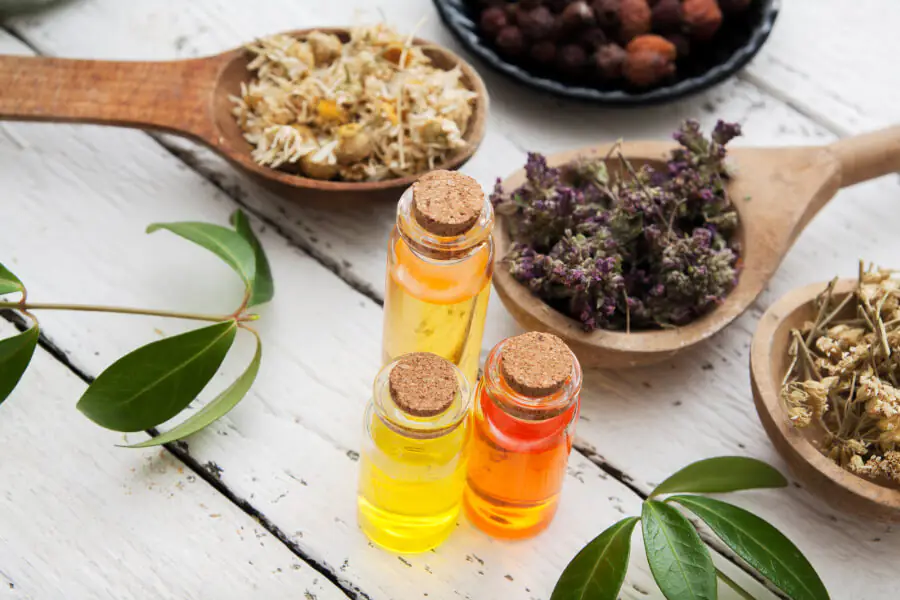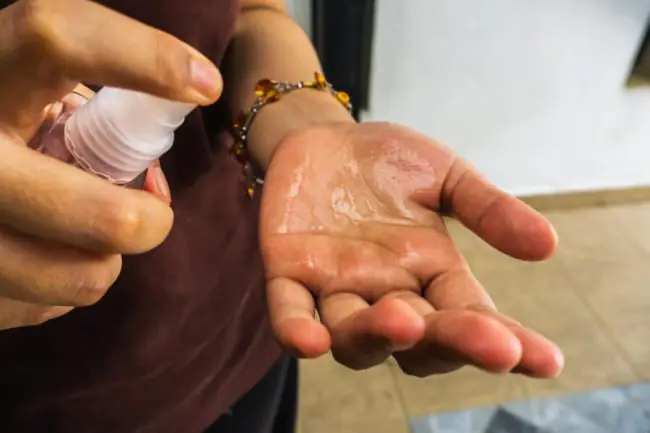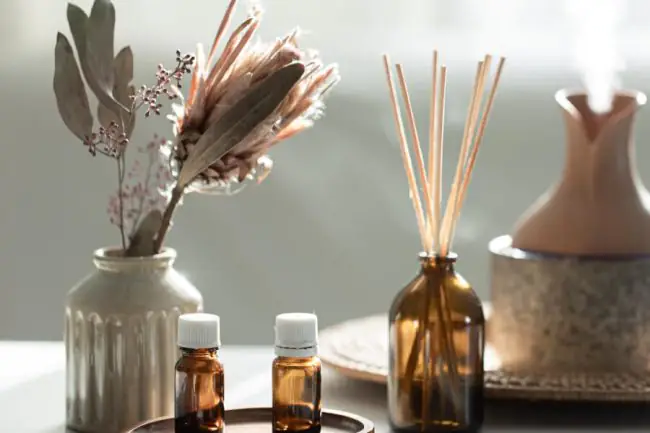Psoriasis is a challenging condition, often leaving individuals feeling frustrated with flare-ups, itching, and discomfort.
Essential oils for psoriasis care have become an increasingly popular choice. Known for their powerful healing properties, essential oils for psoriasis are natural remedies that can reduce some of the worst symptoms of psoriasis and promote overall skin wellness.
There is a connection between essential oils for psoriasis and four unique ways these oils can make a difference in your psoriasis care.
What might be the solution? Try natural alternatives to support skin health like those have been gathered here for you!
Essential Oils and Psoriasis Management Relationship
Psoriasis is caused by an automatic response in the body that encourages fast skin cell growth resulting in skin inflammation.
While topical creams and medications can help, adding essential oils for psoriasis can help relieve the skin.
The therapeutic properties of essential oils for psoriasis can soothe the skin, reduce inflammation, and prevent infection.
Essential oils for psoriasis support overall skin health by improving hydration and skin regeneration not only for inflammation.
Essential oils for psoriasis can have a calming effect on the mind, which is beneficial since stress can sometimes trigger or worsen psoriasis flare-ups.
Top Essential Oils for Psoriasis Relief
When looking to add essential oils for psoriasis into your care routine, there are several oils that stand out for their effectiveness. Here are four of the best oils to consider:
Lavender Essential Oil: Calming and Healing for Psoriasis
Lavender oil is one of the most popular essential oils for psoriasis due to its ability to soothe irritated skin and reduce redness.
Known for its calming properties, lavender helps reduce stress, a known trigger for psoriasis flare-ups.
The oil’s anti-inflammatory properties can calm itchy, inflamed patches, making it an ideal choice for those dealing with flare-ups.
How to use it: Mix a few drops of lavender essential oil with a carrier oil (such as coconut or jojoba oil) and apply it to the affected areas. This will help reduce inflammation and relieve the irritation from psoriasis.
Tea Tree Oil: A Natural Detergent and Anti-inflammatory
Tea tree oil is another essential oil for psoriasis care. Known for its anti-inflammatory properties, tea tree oil can prevent infections and reduce the inflammation that comes with psoriasis.
It’s particularly helpful for treating scalp psoriasis, where its soothing effects can reduce peeling and relieve irritation.
How to use it: Mix tea tree oil with a carrier oil, and gently massage it into the scalp or affected areas. It’s important to perform a patch test before full use to ensure no reactions occur.
Bergamot Oil: Improving Skin Health
Bergamot oil, extracted from citrus fruit, is known for its ability to improve skin health and reduce inflammation.
For those dealing with psoriasis, bergamot oil works by balancing the skin’s oils, preventing excessive dryness or oiliness.
Its healing properties improve smoother, healthier skin by reducing irritation and improving the skin’s natural healing process.
How to use it: Combine a few drops of bergamot oil with a carrier oil and apply it to your psoriasis patches to help reduce redness and irritation. The uplifting scent of bergamot can also improve mood and reduce stress.
Chamomile Oil: Soothing Redness and Irritation
Chamomile essential oil is a gentle, calming oil known for its ability to soothe irritated skin and reduce redness.
With its anti-inflammatory and antioxidant properties, chamomile can relieve discomfort from psoriasis flare-ups. It’s also great for those with sensitive skin, as it’s less likely to cause further irritation.
How to use it: Chamomile oil can be used by mixing with other oils like lavender or bergamot. Mix it in a carrier oil and gently massage it into the affected areas to reduce inflammation and soothe the skin.
How to Safely Add Essential Oils for Psoriasis Care
When using essential oils for psoriasis care, it’s important to follow some basic guidelines to ensure safety and effectiveness.
Topical Application Techniques
- Dilution: Always mix essential oils for psoriasis with a carrier oil to prevent skin irritation. Put 1-2 drops of essential oil for every teaspoon (5 mL) of carrier oil.
- Patch Test: Before using any new essential oil, perform a patch test on a small area of skin to check for allergic reactions or irritation. Apply a small amount of the diluted oil to your forearm and wait for 24 hours to ensure your skin does not react negatively.
- Massage: Gently massaging the oils into the skin improves their absorption and helps soothe affected areas more effectively.
Essential Oil Recipes for Psoriasis: Blends to Try
Here are some simple yet effective essential oil blends for psoriasis:
- Soothing Lavender & Chamomile Blend: Mix 3 drops of lavender oil and 3 drops of chamomile oil with 1 tablespoon of coconut oil. Apply this blend to inflamed psoriasis patches for a calming effect.
- Healing Bergamot & Tea Tree Blend: Combine 2 drops of bergamot oil with 2 drops of tea tree oil and dilute with 1 tablespoon of olive oil. Massage this blend into areas with flaky psoriasis patches for relief.
Dosage and Dilution: Best Practices for Safety
For safe application, it’s recommended to use essential oils for psoriasis at a concentration of 1-2%.
That means using 1-2 drops of essential oil per teaspoon of carrier oil. If you have sensitive skin, start with a small concentration and gradually increase the amount as needed.
Other Practices to Reap Essential Oil Benefits
While essential oils for psoriasis can provide relief, combining them with other holistic practices can further improve results.
Aromatherapy: Stress Reduction for Psoriasis Management
Stress can trigger or worsen psoriasis symptoms, try adding aromatherapy to your routine that can help manage this trigger. Oils like lavender, chamomile, and bergamot are perfect for relaxation and stress relief.
Diffusing these oils in your home or adding a few drops to a bath can reduce overall stress and potentially decrease the frequency of flare-ups.
Hydration and Diet: Support Skin Health With Essential Oils for psoriasis
For psoriasis management, it’s also important to stay hydrated and maintain a diet that supports healthy skin.
Drink plenty of water, and include foods rich in omega-3 fatty acids (such as fatty fish, flaxseeds, and walnuts) to help reduce inflammation in the body.
Mindfulness and Relaxation Techniques
Mindfulness practices like yoga, meditation, or deep breathing can also help reduce stress, improving psoriasis symptoms over time.
These techniques can be valuable in using essential oils for psoriasis to manage the condition successfully.
Risks When Using Essential Oils for Psoriasis
Even though essential oils for psoriasis can be beneficial, it’s essential to be aware of potential risks:
- Allergic reactions: Always perform a patch test to check for any allergies before applying essential oils for psoriasis to larger areas.
- Skin irritation: Some oils can irritate sensitive skin. If any discomfort occurs, discontinue use immediately.
- Pregnancy and health conditions: Certain essential oils for psoriasis may not be suitable during pregnancy or for individuals with specific health concerns. Always consult your Gynecologist before starting any new treatment.
Conclusion
Essential oils for psoriasis offer a natural and effective way to complement traditional psoriasis treatments.
By adding oils like lavender, tea tree, bergamot, and chamomile, you can soothe irritated skin, reduce inflammation, and support overall skin health.
Pairing essential oils for psoriasis with other healthy practices like hydration, stress management, and mindfulness will help in managing your condition.
Always ensure you’re using essential oils for psoriasis safely by following dilution guidelines and patch tests.
FAQs
What is the oil recipe for psoriasis?
Try blending lavender, chamomile, and coconut oil for a soothing treatment that reduces redness and inflammation.
What herbs and oils help psoriasis?
Lavender, tea tree, bergamot, and chamomile are all great options for calming and healing psoriasis patches.
What oil helps scalp psoriasis?
Tea tree oil is especially effective for scalp psoriasis, helping to relieve itching and flaking.
Which oil is best for eczema and psoriasis?
Lavender and chamomile oils are ideal for both eczema and psoriasis due to their calming, anti-inflammatory properties.







